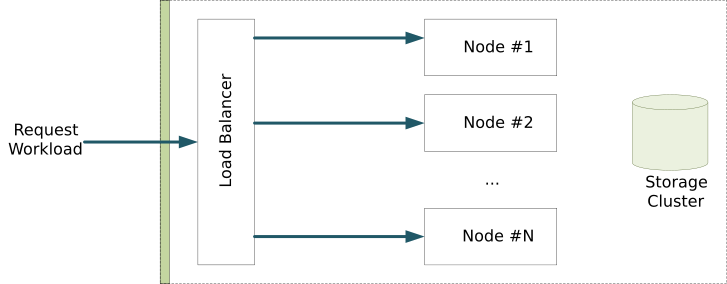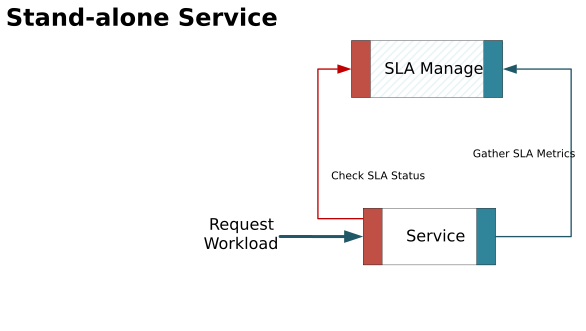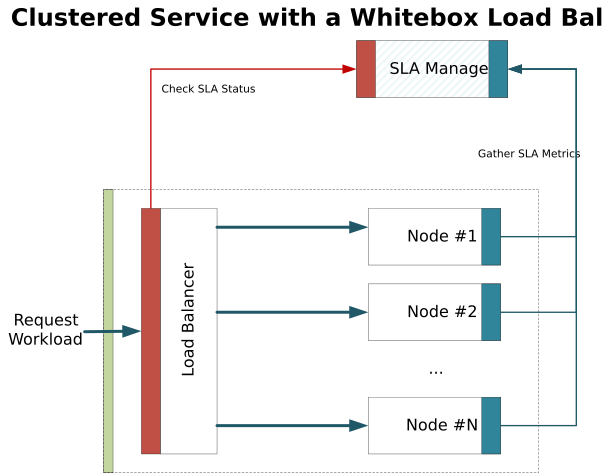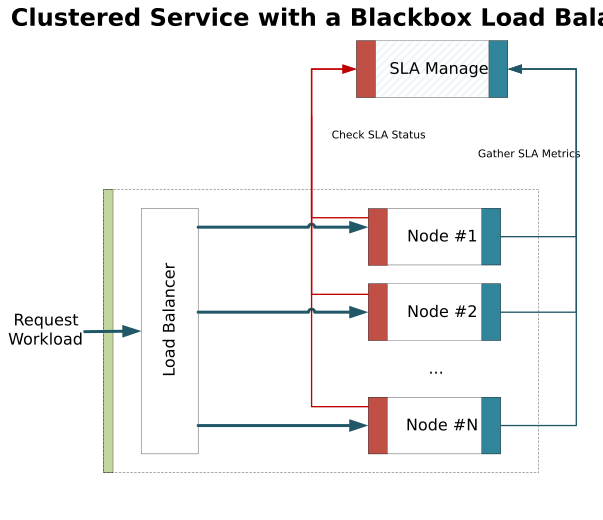SLA for Open API Initiative Specification (Research Version)
The key words “MUST”, “MUST NOT”, “REQUIRED”, “SHALL”, “SHALL NOT”, “SHOULD”, “SHOULD NOT”, “RECOMMENDED”, “MAY”, and “OPTIONAL” in this document are to be interpreted as described in RFC 2119.
Revision History
| Version | Date | Notes |
|---|---|---|
| 0.1 | 2015-12-18 | Initial draft. |
| 0.2 | 2016-05-05 | Incorporate Review 01. |
| 0.3 | 2016-05-10 | Incorporate Review 02. |
| 0.4 | 2016-05-23 | Incorporate Review 03. |
| 0.5 | 2016-05-20 | Incorporate Review 04. |
| 0.6 | 2016-05-24 | Incorporate Review 05. |
| 0.7 | 2016-06-07 | Incorporate Review 06. |
| 0.8 | 2016-06-22 | Incorporate Review 07. |
| 0.9 | 2016-07-10 | Incorporate Review 08. |
| 0.9.1 | 2016-07-28 | Incorporate Review 09. |
| 0.9.2 | 2018-11-26 | Fixing typos. |
| 0.9.3 | 2019-01-31 | Update references to latest OpenAPI Specification (v3.0.2). |
| 0.9.4 | 2021-09-13 | Add custom field to PricingObject. |
| 0.9.5 | 2021-09-16 | Add custom field to LimitObject. |
| 0.10.0 | 2023-04-12 | Add PeriodObject, CostObject, OverageCost and globbing. |
1. Introduction
SLA4OAI is an open source standard for describing SLA in APIs.
Based on the standards proposed by the OAI, SLA4OAI builds on top of it to add an optional profile for defining SLA (Service Level Agreements) over the APIs.
This SLA definition in a neutral vendor flavor will allow fostering innovation in the area where APIs expose and documents its SLA, API Management tools can import and measure such key metrics and composed SLAs for composed services aggregated way in a standard way.
1.1 Contents
A. This specification describes the format for defining SLAs over APIs in a neutral technology way.
B. The Basic SLA Management Service spec provides a basic non-normative runtime proposal API for SLA measuring and enforcing, as defined in (A).
C. Reference implementations are provided to show (A) and (B) in a real examples:
- Server side implementations:
- Client side implementations: plugins for generated Hivepod backends.
2. Execution Model
The execution model for SLA assumes as little as possible about the system to track the SLA to make it applicable in many scenarios.

Figure 1. Basic deployment for an API.
Figure 1 shows a basic production deployment for a service exposing an API enhancement with a load-balancer and service redundancy for fault tolerance.
In order to instrument for SLA enforcement, some new services can be added to the picture, these services can be grouped into one unit called SLA Manager or it can be one or more independent services with different elasticity and scalability.
The roles considered are:
- Service to instrument (single node or replicated)
- Load balancer (optional)
- SLA Manager (for SLA tracking)
Following the principle of Separation of Concerns, the SLA Manager exposes a simple API for tracking SLA and reporting metrics.
The service to be instrumented could be deployed as a single instance, cluster, with or without a front load balancer, etc.
Figures 2, 3 and 4 shows different possible configurations deployments.

Figure 2. Stand-alone deployment.
Stand-alone deployments are typical in development scenarios where debugging is prioritized over high availability. In this scenario, load-balancers are not involved and service is provided from a single node.

Figure 3. Cluster with whitebox load-balancer deployment.
A cluster with a whitebox load-balancer contains more than one nodes for the API and a load-balancer we can parametrize to verify the current state of the SLA on requests. Based on the state, the balancer can deny or allow the service. The balancer is only responsible for checking SLA status, all metrics information gathered in the service node.

Figure 4. Cluster with blackbox load-balancer deployment.
On the other hand, A cluster with a blackbox load-balancer cannot be parametrized for SLA checking. Therefore, SLA check and SLA enforce policies must be executed as middleware in the entrypoint for each service node.
Depending on the environment used: local development environment, private or public cloud, IaaS or PaaS you will find these different scenarios where an API is served.
3. Lifecycle of Agreement
The lifecycle of any SLA agreement has two phases:
- The service provider designs the levels (plans) of the service, then define the Plans document. See an example at petstore-plans.yml.
- The consumer chooses the levels (plans) he needs, then both provider and consumer agree on the SLA document. See an example at pro-petstore-sla.yml.
4. Samples
4.1 Petstore
This sample illustrates a simple resource-based API for Pets database.
- The full OpenAPI description is provided in petstore-service.yml.
- The service provides a template SLA is described in petstore-plans.yml.
- The SLA between the provider and consumer is described in pro-petstore-sla.yml.
5. Specification
A SLA4API document is built as an extension to a given OpenAPI document. This extension will add an SLA definition to all or part of the services exposed in the API. A full SLA definition is a JSON or a YAML document composed of the following structure.
5.1 Reference from an OpenAPI document
To declare a given API exposes an SLA, the OpenAPI description is extended with an optional attribute
x-sla inside the info object. The value contains a URI pointing to the document describing the SLA.
Example:
{
"openapi": "3.0.2",
"info":{
"title": "Sample Pet Store API (by Swagger)",
"version": "1.0.0",
"x-sla": "./petstore-plans.yml"
}
}
openapi: "3.0.2"
info:
version: 1.0.0
title: Sample Pet Store API (by Swagger)
x-sla: ./petstore-plans.yml
5.2 SLA Document Schema
5.2.1 SLA Object
The SLA Object must conform to the following constraints.
| Field Name | Type | Description |
|---|---|---|
| context | ContextObject |
Required Holds the main information of the SLA context. |
| infrastructure | InfrastructureObject |
Required Provides information about tooling used for SLA storage, calculation, governance, etc. |
| pricing | PricingObject |
Optional Global pricing data. |
| metrics | MetricsObject |
Required A list of metrics to use in the context of the SLA. |
| plans | PlansObject |
Optional A set of plans to define different service levels per plan. |
| quotas | QuotasObject |
Optional Global quotas, these are the default quotas, but they could be overridden by each plan later. |
| rates | RatesObject |
Optional Global rates, these are the default rates, but they could be overridden by each plan later. |
| guarantees | GuaranteesObject |
Optional Global guarantees, these are the default guarantees, but they could be overridden by each plan later. |
| configuration | ConfigurationsObject |
Optional Define the default configurations, later each plan can be override it. |
5.2.2 ContextObject
Holds the main information about the SLA context.
| Field Name | Type | Description |
|---|---|---|
| id | string |
Required The identification of the SLA context. |
| version | string |
Required Indicates the version of the SLA format ='1.0'. |
| api | uri |
Required Indicates a URI (absolute or relative) describing the API, described in the OpenAPI format, to be instrumented. |
| type | string |
Required The type of SLA based on the Lifecycle of Agreement (plans or instance). |
| provider | string |
Optional Provider information: data about the owner/host of the API. This field is required in case of the context type is instance. |
| consumer | string |
Optional Consumer information, data about the entity that consumes the service. This field is required in case of the context type is instance. |
| validity | ValidityObject |
Optional Availability of the service expressed via time slots. This field is required in case of the context type is instance. |
Example:
{
"context": {
"id": "PetPlans",
"version": 1,
"api": "https://sla-petstore.herokuapp.com/api/swagger.json",
"type": "instance",
"provider": "ISAGroup",
"consumer": "tenant1",
"validity": {
"effectiveDate": "2016-01-12T12:57:37.345Z",
"expirationDate": "2017-01-12T12:57:37.345Z"
}
}
}
context:
id: PetPlans
version: 1.0
api: https://sla-petstore.herokuapp.com/api/swagger.json
type: instance
provider: ISAGroup
consumer: tenant1
validity:
effectiveDate: 2016-01-12T12:57:37.345Z
expirationDate: 2017-01-12T12:57:37.345Z
5.2.3 ValidityObject
Holds the availability of the service expressed via time slots.
| Field Name | Type | Description |
|---|---|---|
| effectiveDate | string |
Required The starting date of the SLA agreement using the ISO 8601 time intervals format. |
| expirationDate | string |
Optional The expiration date of the SLA agreement using the ISO 8601 time intervals format. |
Example:
{
"validity": {
"effectiveDate": "2016-01-12T12:57:37.345Z",
"expirationDate": "2017-01-12T12:57:37.345Z"
}
}
validity:
effectiveDate: 2016-01-12T12:57:37.345Z
expirationDate: 2017-01-12T12:57:37.345Z
5.2.4 InfrastructureObject
The infrastructure object describes the operational tooling to use in the service execution.
| Field Name | Type | Description |
|---|---|---|
| supervisor | uri |
Required Location of the SLA Check service accordingly to the Basic SLA Management Service spec. |
| monitor | uri |
Required Location of the SLA Metrics endpoint accordingly to the Basic SLA Management Service spec. |
| {name} | uri |
Optional Optional endpoints of SLA governance infrastructure. |
Example:
{
"infrastructure":{
"supervisor": "http://supervisor.sla4oai.governify.io/v1/",
"monitor": "http://monitor.sla4oai.governify.io/v1/"
}
}
infrastructure:
supervisor: "http://supervisor.sla4oai.governify.io/v1/"
monitor: "http://monitor.sla4oai.governify.io/v1/"
5.2.5 PricingObject
Describes the general information of the pricing of the API.
| Field Name | Type | Description |
|---|---|---|
| cost | number |
Optional Cost associated with this service. Ignored if custom is set to true. Defaults to 0 if unspecified. |
| custom | boolean |
Optional Whether this service has a custom cost to be negotiated with its provider. If set to true, the cost should not be specified and will be ignored in that case. Defaults to false. |
| currency | string |
Optional Currency used to express the cost. Supported currency values are expressed in ISO 4217 format. Samples: USD, EUR, or BTC for US dollar, euro, or bitcoin, respectively. Defaults to USD if unspecified. |
| billing | string |
Optional Period used for billing. Supported values are: - onepay Unique payment before start using the service. - daily Billing at end of the day. - weekly Billing at end of the week. - monthly Billing at end of the month. - quarterly Billing at end of the quarter. - yearly Billing at end of the year. Defaults to monthly if unspecified. |
Example:
{
"pricing":{
"cost": 0,
"custom": false,
"currency": "euro",
"billing": "monthly"
}
}
pricing:
cost: 0
custom: false
currency: "euro"
billing: "monthly"
5.2.6 MetricsObject
Contains definitions of metrics with name, types and descriptions. References can be used to reuse definitions of pre-existing metrics.
| Field Name | Type | Description |
|---|---|---|
| {name} | MetricObject |
Optional Definitions of metrics with name, types and descriptions. |
| {name} | object {"$ref": uri} |
Optional Reference to pre-existing metrics in external file. |
Example:
{
"metrics": {
"animalTypes": {
"type": "integer",
"format": "int64",
"description": "Number of different animal types.",
"resolution": "check"
},
"requests": {
"$ref": "./metrics.yml#request"
}
}
}
metrics:
animalTypes:
type: integer
format: int64
description: Number of different animal types.
resolution: check
requests:
$ref: ./metrics.yml#request
In the above example, we referred to a pre-existing metrics metrics.yml which has some predefined metrics like requests and responseTime.
5.2.7 MetricObject
Contains definitions of metric with type, description and unit of the metric.
| Field Name | Type | Description |
|---|---|---|
| type | string |
Required This is the metric type accordingly to the OAI spec format column. |
| format | string |
Optional The extending format for the previously mentioned type. See Data Type Formats for further details. |
| description | string |
Optional A brief description of the metric. |
| unit | string |
Optional The unit of the metric. |
| resolution | enum [check, consumption] |
Optional Determine when this metric will be resolved. If value is check the metric will be sent before the calculation of SLA state, else if value is consumption the metric will be sent after consumption. |
Example:
{
"animalTypes": {
"type": "integer",
"format": "int64",
"description": "Number of different animal types.",
"resolution": "check"
}
}
animalTypes:
type: integer
format: int64
description: Number of different animal types.
resolution: check
5.2.8 PlansObject
Contains a list of plans describing different levels of service and prices.
| Field Pattern | Type | Description |
|---|---|---|
| {planName} | PlanObject |
Describes a usage plan for the API with its associate costs, availability and guarantees. |
Example:
{
"plans": {
"free": {
"rates": {
"/pets/{id}": {
"get": {
"requests": [
{
"max": 1,
"period": {
"amount": 1,
"unit": "second"
}
}
]
}
}
}
},
"pro": {
"pricing": {
"cost": 50
},
"quotas": {
"/pets": {
"get": {
"requests": [
{
"max": 20,
"period": {
"amount": 1,
"unit": "second"
},
"cost": {
"overage: {
"overage": 1,
"cost": 0.0001
}
}
}
]
}
}
}
}
}
}
plans:
free:
rates:
/pets/{id}:
get:
requests:
- max: 1
period:
amount: 1
unit: second
pro:
pricing:
cost: 50
quotas:
/pets:
get:
requests:
- max: 20
period:
amount: 1
unit: second
cost:
overage:
overage: 1
cost: 0.0001
5.2.9 PlanObject
Describes a plan in full.
| Field Name | Type | Description |
|---|---|---|
| configuration | ConfigurationsObject |
Optional Configuration parameters for the service tailored for the plan. |
| availability | string |
Optional Availability of the service for this plan expressed via time slots using the ISO 8601 time intervals format. |
| pricing | PricingObject |
Optional Specific pricing data for this plan. Overrides default pricing data defined before. |
| quotas | QuotasObject |
Optional Specific quotas data for this plan. Overrides default quotas data defined before. |
| rates | RatesObject |
Optional Specific rates data for this plan. Overrides default rates data defined before. |
| guarantees | GuaranteesObject |
Optional Specific guarantees data for this plan. Overrides default guarantees data defined before. |
Example:
{
"pro": {
"pricing": {
"cost": 50
},
"configuration": {
"filteringType": "multipleTags"
},
"quotas": {
"/pets": {
"get": {
"requests": [
{
"max": 20,
"period": {
"amount": 1,
"unit": "second"
},
"cost": {
"overage: {
"overage": 1,
"cost": 0.0001
}
}
}
]
}
}
},
"guarantees": {
"global": {
"global": [
{
"objective": "avgResponseTimeMs <= 250",
"period": "daily",
"window": "dynamic"
}
]
}
}
}
}
pro:
pricing:
cost: 50
configuration:
filteringType: multipleTags
quotas:
/pets:
get:
requests:
- max: 20
period:
amount: 1
unit: second
cost:
overage:
overage: 1
cost: 0.0001
guarantees:
global:
global:
- objective: avgResponseTimeMs <= 250
period: daily
window: dynamic
5.2.10 QuotasObject
Contains a map from name to PathObject describing the quota limits for the service on the current plan.
| Field Pattern | Type | Description |
|---|---|---|
| {pathName} | PathObject |
Optional Describes the API endpoint path quota configurations. |
Example:
{
"quotas": {
"/pets": {
"get": {
"requests": [
{
"max": 20,
"period": {
"amount": 1,
"unit": "second"
},
"cost": {
"overage: {
"overage": 1,
"cost": 0.0001
}
}
}
]
}
}
}
}
quotas:
/pets:
get:
requests:
- max: 20
period:
amount: 1
unit: second
cost:
overage:
overage: 1
cost: 0.0001
5.2.11 RatesObject
Contains a map from name to PathObject describing the rate limits for the service on the current plan.
| Field Pattern | Type | Description |
|---|---|---|
| {pathName} | PathObject |
Optional Describes the API endpoint path rate configurations. |
Example:
{
"rates": {
"/pets/{id}": {
"get": {
"requests": [
{
"max": 1,
"period": {
"amount": 1,
"unit": "second"
}
}
]
}
}
}
}
rates:
/pets/{id}:
get:
requests:
- max: 1
period:
amount: 1
unit: second
5.2.12 GuaranteesObject
Contains a map from name to GuaranteeObject describing the guarantees for the service on the current plan.
| Field Pattern | Type | Description |
|---|---|---|
| {pathName} | GuaranteeObject |
Optional Describes a guarantee level supported by the plan. |
Example:
{
"guarantees": {
"global": {
"global": [
{
"objective": "avgResponseTimeMs <= 250",
"period": "daily",
"window": "dynamic"
}
]
}
}
}
guarantees:
global:
global:
- objective: avgResponseTimeMs <= 250
period: daily
window: dynamic
5.2.13 GuaranteeObject
Describes a guarantee level supported by the plan.
| Field Name | Type | Description |
|---|---|---|
| {MethodName} | GuaranteeObjectiveObject |
Optional An object describes the guarantee level. |
Example:
{
"global": {
"global": [
{
"objective": "avgResponseTimeMs <= 250",
"period": "daily",
"window": "dynamic"
}
]
}
}
global:
global:
- objective: avgResponseTimeMs <= 250
period: daily
window: dynamic
5.2.14 GuaranteeObjectiveObject
An object describes the guarantee level.
| Field Name | Type | Description |
|---|---|---|
| objective | Expression |
Required The objective of the guarantee. |
| period | string |
Optional The period of the objective (secondly, minutely, hourly, daily, monthly or yearly). |
| window | string |
Optional The state of the Objective (dynamic or static) |
| scope | string |
Optional The scope of who request the service. |
Example:
{
"global": [
{
"objective": "avgResponseTimeMs <= 250",
"period": "daily",
"window": "dynamic",
"scope": "account"
}
]
}
global:
- objective: avgResponseTimeMs <= 250
period: daily
window: dynamic
scope: account
5.2.15 PathObject
The API endpoint path.
| Field Pattern | Type | Description |
|---|---|---|
| {methodName} | OperationObject |
Optional The operations attached to this path. |
Example:
{
"/pets/{id}": {
"get": {
"requests": [
{
"max": 1,
"period": {
"unit": 1,
"amount": "second"
},
"cost": {
"overage: {
"overage": 1,
"cost": 0.0001
}
}
}
]
}
}
}
/pets/{id}:
get:
requests:
- max: 1
period:
unit: 1
amount: second
cost:
overage:
overage: 1
cost: 0.0001
5.2.16 OperationObject
The operations attached to the path.
| Field Pattern | Type | Description |
|---|---|---|
| {metricName} | LimitObject |
Optional The allowed limits of the metric. |
Example:
{
"get": {
"requests": [
{
"max": 20,
"period": {
"amount": 1,
"unit": "second"
},
"cost": {
"overage: {
"overage": 1,
"cost": 0.0001
}
}
}
]
}
}
get:
requests:
- max: 20
period:
amount: 1
unit: second
cost:
overage:
overage: 1
cost: 0.0001
5.2.17 LimitObject
The allowed limits of the metric.
| Field Pattern | Type | Description |
|---|---|---|
| max | number |
Optional Max value that can be accepted. Required if custom is set to false, but ignored if set to true. |
| custom | boolean |
Optional Whether there is a custom limit to be negotiated with its provider. If set to true, the max field should not be specified and will be ignored in that case. Defaults to false. |
| period | PeriodObject |
Optional The period of the limit. |
| cost | CostObject |
Optional Additional costs of the limit. |
Example:
{
"max": 20,
"custom": false,
"period": {
"amount": 1,
"unit": "second"
},
"cost": {
"overage: {
"overage": 1,
"cost": 0.0001
}
}
}
max: 20
custom: false
period:
amount: 1
unit: second
cost:
overage:
overage: 1
cost: 0.0001
5.2.18 PeriodObject
The period of the limit.
| Field Pattern | Type | Description |
|---|---|---|
| amount | number |
Required The amount of units of the period. |
| unit | string |
Required The unit of the period (second, minute, day, etc.). |
Example:
{
"amount": 1,
"unit": "second"
}
amount: 1
unit: second
5.2.19 CostObject
Additional costs of the limit.
| Field Pattern | Type | Description |
|---|---|---|
| overage | OverageObject |
Required Details about overage costs of the limit. |
Example:
{
"overage: {
"overage": 1,
"cost": 0.0001
}
}
overage:
overage: 1
cost: 0.0001
5.2.20 OverageObject
Details about overage costs of the limit.
| Field Pattern | Type | Description |
|---|---|---|
| overage | number |
Required The number of units of the metric to apply overage costs. |
| cost | number |
Required The overage costs that apply when exceeding the limit. |
Example:
{
"overage": 1,
"cost": 0.0001
}
overage: 1
cost: 0.0001
5.2.21 ConfigurationsObject
Configurations description.
| Field Pattern | Type | Description |
|---|---|---|
| {name} | string |
Optional Configurations description. |
Example:
{
"configuration": {
"filteringType": "multipleTags",
"xmlFormat": true
}
}
configuration:
filteringType: multipleTags
xmlFormat: true
6. Expressions
Guarantee’s objective is expressed as a boolean expression which produces a Boolean value when evaluated.
6.1 Supported expressions
Currently, only simple comparison operators are supported.
Supported operators:
| Operator | Name of operator |
|---|---|
< |
less than |
<= |
less than or equal to |
== |
equal to |
!= |
not equal to |
>= |
greater than or equal to |
> |
greater than |
6.2 Expression BNF
Supported expression syntax has a single form: Property + Operator + Value
<expression> ::= <variable> <op> <value>
<op> ::= '<' | '<=' | '==' | '!=' | '>=' | '>'
<value> ::= <integer> | <string> | <double>
7. Globbing
SLA4OAI supports globbing to simplify pricings where the same limitation applies to multiple paths and/or methods. The character * can be used as a wildcard to apply a limitation to multiple endpoints. For example, limitations attached to /v1/* apply to all endpoints whose paths start with /v1, such as /v1/pets or /v1/owner/4/pets, but it would not apply to /api/v1/pets because there is no wildcard before /v1. For methods, the word all can be used to indicate that a limitation in a certain endpoint (globbed or not) will apply to all methods.
More restrictive globbed paths have higher priority than less restrictive paths. This means that if and endpoint matches two or more globbed paths with different limitations, the limitations in the more restrictive path will override the limitations in the others, if defined for the same metrics and methods. For example, if there are limitations defined for all methods in /v1/* and other limitations for the same metric for get in /v1/pets/*, the endpoint /v1/pets/8 would have the second limitations for the GET method and the first limitations for any other methods, if available.